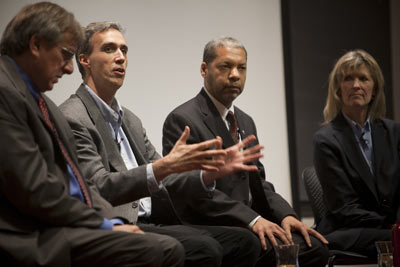Now, the real work begins on the NYC tech campus
By Anne Ju

Six weeks ago, Cornell President David Skorton got a call from New York City Mayor Michael Bloomberg's office: Cornell had won the competition to build a tech campus in the city. A flurry of celebration ensued.
Now the real work begins.
On Feb. 3, leaders of the tech campus initiative held an open forum to answer questions, provide updates and reiterate the transformative nature of the project for Cornell as a whole.
The event was moderated by Cornell Provost Kent Fuchs and included Dan Huttenlocher, dean of computing and information science; Lance Collins, dean of the College of Engineering; and Cathy Dove, associate dean of administration in the College of Engineering.
CornellNYC Tech -- home of the Technion-Cornell Innovation Institute, in partnership with Technion-Israel Institute of Technology, is scheduled to break ground in mid-2014. Cornell's partner, the Technion, will bring needed expertise in entrepreneurship to the new venture, Collins said.
"Their ability to take ideas and spin them out into working companies is legendary," Collins said.
Between now and then, there's work to be done at all levels, Fuchs said, from acquiring academic accreditation, to hiring a principal designer and architect for the site, to structuring the entrepreneurship-oriented curricula, to hiring faculty and recruiting students -- all while maintaining Cornell's Ithaca campus and entering into key phases of the "Cornell Now" fundraising campaign.
The new campus is intended to be financially self-sufficient, Fuchs said. A $350 million gift from Atlantic Philanthropies, announced in the days leading up to Cornell's winning bid, will help the university immediately start recruiting and hiring new faculty to populate the campus. None of the Ithaca campus's $2 billion operating budget is expected to be diverted to the new campus, Fuchs said.
Fuchs went on to predict that having the tech campus in New York City will create a symbiotic flow of people and ideas that will end up attracting people -- and philanthropy -- to Cornell in Ithaca, not just New York City.
"It elevates the visibility of Ithaca as a city and Tompkins County and all of this environment we love, and puts us on a worldwide stage that we've never had before as a community," Fuchs said. He noted, for example, the inaugural tech startup fair held in Ithaca Feb. 1; hundreds attended, probably due in large part to the tech campus bid.
Huttenlocher said he and Collins are engaging with faculty members to commence academic planning for the new campus. As soon as accreditations and approvals are in place, students will start being admitted to specific degree programs, initially professional master's degrees in select fields that are core to the new campus.
Between now and approximately the end of March, the leadership team will "take a step back" and engage many people in the process of ironing out the details of bringing the campus from idea to reality, Dove said. Fuchs added that a website is forthcoming through which people can ask questions or make suggestions about anything from aesthetics to programming.
The year 2012 will bring work on environmental reviews of the site, master planning and opening a satellite campus in leased space, which is to be occupied by current Ithaca-based students.
Fuchs shared some rough dates: Cornell expects to sign the official lease for the site in December 2013. January 2014 will see demolition of Goldwater Hospital, which currently occupies the future campus site. Phase I construction will commence in July 2014 and is scheduled to open in 2017.
----------
Correction: This article has been corrected to reflect that faculty members are engaged in academic planning for the new campus, which will initially offer master's degrees.
Media Contact
Get Cornell news delivered right to your inbox.
Subscribe